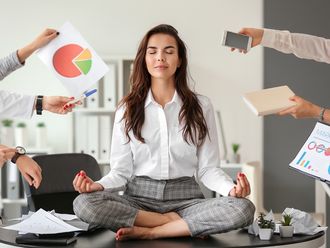
Whether it's emotional health advice or fitness tips, there is an abundance of information out there - which is sometimes not such a good thing. It's easy to get confused, confounded and side-tracked with all this often-conflicting information. Friday decided to cut to the chase to ask five experts in their respective fields - a fitness pro, nutritionist, dermatologist, GP and psychologist - the health habits they practise in their day-to-day lives, so you can too. Read on to find out which of their health secrets you can incorporate into your life, to get on the road to physical and emotional well-being today.
The fitness expert
Bernadette Abraham, fitness professional (www.BernaciseMe.com)
"I usually work out at home, and always vary my exercises and do unconventional body weight exercises which mimic daily activities - therefore putting the body in different positions like twisting and rotating - as well as use dumbbells," says Bernadette, a mother of four. "I work out on a daily basis, at least 20 minutes per session."
Bernadette's workouts are short, intense and focus on the whole body. She also prefers to do compound exercises that focus on more than one muscle group, as this maximises the effectiveness of her workout, which always includes resistance and cardiovascular training. "I make it a point to follow a workout with a stretching routine," she adds.
If you do only one thing: Sneak exercise into your daily activities, such as walking around during commercial breaks when watching TV.
The nutrition expert
Lily Mueller, nutritionist at Dubai Herbal & Treatment Centre (www.dubaihtc.com)
Variety is the spice of life, says Lily, so she tries to eat differently every single day - combining carbohydrates, healthy fats, fibre and proteins.
She says it's best to have four to six light meals rather than three heavy meals a day. "I usually have a big breakfast of fresh fruit, slice of gluten-free, high-fibre bread and a cup of green tea to kick-start my metabolism," she says. "I also try to make breakfast and lunch my most substantial meals of the day as the digestive system slows down as the day progresses."
For lunch, Lily opts for a big salad with fresh vegetables, and some protein in the form of skinless grilled chicken breast or fresh tuna, depending on what's in her fridge. Her day ends with an early light dinner, which usually consists of a bowl of vegetable soup and a slice of bread or rice crackers "as this is best for optimum digestion". Her top tip is to keep the fridge stocked with healthy ingredients.
Lily also keeps her body well-hydrated through the day by drinking lots of water, herbal teas and vegetable broth.
If you do only one thing: Start your day with a glass of lukewarm water with freshly squeezed lemon or lime juice to detoxify your system.
The skin expert
Dr Fatma Shaban, Dermatologist, Dr Alrostom Medical and Day Care Surgery Centre, Jumeirah, Dubai (www.skin-and-laser.com)
Dr Shaban's major beauty concern is visible signs of ageing and dull skin. To keep hers healthy, Dr Shaban ensures that she removes make-up and cleanses her face every night. "I am always careful to remove every last trace of product and chemicals before going to bed, as they can clog pores if left on the skin overnight," she says. "It's also important to wash the face to remove dirt, environmental pollutants, bacteria and excessive oil accumulated during the day."
She also works at keeping her skin looking young by working from the inside out. "I drink around 1.5 litres of water a day and eat a balanced diet making sure to include Vitamin C, as it contains antioxidants, and is good for skin's elasticity.
"I also apply sunscreen whenever I venture outdoors during the hot summer months," she says. "Above all I make sure all the products I'm using - soaps, moisturisers and sunblocks - are suitable for my skin type."
If you do only one thing: After washing your face, wait five minutes before applying a moisturiser - pick one that contains vitamin C.
The medical expert
Dr Anees Fatima, GP, specialist family medicine, The City Hospital, Dubai (www.thecityhospital.com)
Routine general health exams that are designed to screen for common diseases are essential for people after a certain age, to enable early detection and prevention of any potential problems.
According to Dr Anees, it is advisable to start going for routine testing when you hit your 30s. "I have my weight and blood pressure checked regularly to find out if I'm within the normal healthy range," she says. Especially in the UAE, where there is a high prevalence of obesity (around 34 per cent in adults), keeping track of your weight is fundamental. Obesity is also linked to diabetes, and around 20 per cent of the population suffer from diabetes, she adds.
"Plus, the regular check-ups I undergo at least once a year include full blood count, thyroid function tests, fasting blood glucose (sugar), fasting lipid profile (cholesterol levels) and vitamin D levels," she adds. If these tests are normal, they can be repeated in a year; however, if they're out of range, especially elevated glucose and cholesterol levels, then they should be repeated after six months following lifestyle changes.
Dr Anees recommends a pap smear and breast ultrasound once a year for women over 30, and says a yearly eye and dental check up are important. Other age- and gender-specific tests include: Colon cancer screening for those over 50; annual mammogram for women over 40 and an osteoporosis screening from 60 onwards; PSA (prostate specific antigen) testing for men should start at 50.
Aside from regular check-ups, Dr Anees's top tip for maintaining health is keeping stress at bay.
If you do only one thing: Make sure you have a detailed consult with your doctor every year.
The emotional health expert
Devika Singh, licensed psychologist and learning enrichment specialist (www.dubaihtc.com) at Dubai Herbal & Treatment Centre
Søren Kierkegaard, Danish philosopher, famously said, "Most men pursue pleasure with such breathless haste that they hurry past it". His aphorism rings true for Devika, who says that as a rehabilitated speed-aholic, she tries to, "Stop, savour and contemplate, as this brings more meaning to everything we do", in order to ensure her emotional well-being.
To get a clear perspective on life, Devika prescribes herself some random ambling time - at least a couple of hours a few times a week - because she believes it is a basic human need to switch off at times, and pursue something relaxing as well as pleasurable. She always looks forward to this time she sets aside for herself. "I don't ask myself what I achieved during this time, but rather I remind myself that I achieved something by doing nothing," she says.
Defining one's purpose is also fundamental to staying balanced and happy, as it can help deliver a sense of understanding and control surrounding your choices and the life events you encounter - good or bad. "Defining your purpose is intended to give you a vision and direction, not to create pressure. Every week, I take out a few minutes to ask myself where I am going and what I may need to change."
According to Devika, the most challenging part is staying on course with your purpose because certain people, events, or causes will always pull you in many different directions. "I try to sift through what I would like to do versus what I can do. It is possible to achieve this through various techniques such as regular diary writing, meditation, yoga and psychological exploration in a counselling setting if necessary," Devika says.
Diary writing can take many forms, including plans, mind maps, goals, ideas, songs, poems, notes about holidays, and sketches. "The process of expressing yourself can help guide decisions and thoughts. The answers are all in there, we just need to put the notes in order to create a symphony," she adds.
If you do only one thing: Start keeping a diary and write down your thoughts - it's very helpful in gaining clarity and helps define true purpose.












